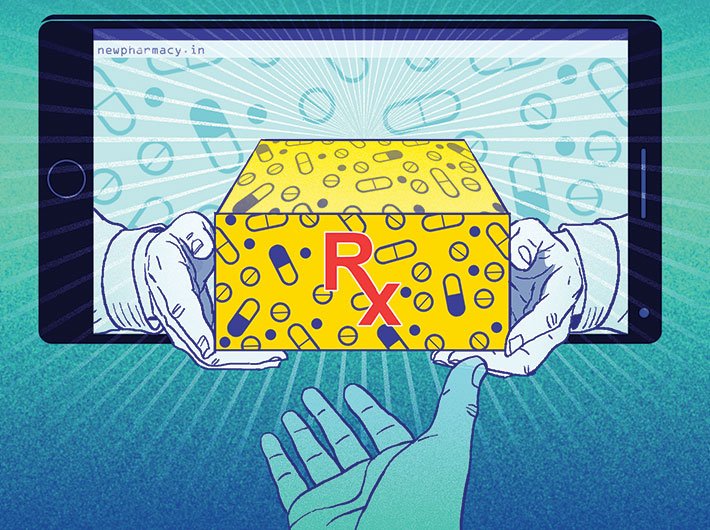Online sale of medicine can help consumers, provided govt guidelines are in place. There are also important matters like patient privacy to address
Pawan Kumar’s doctor prescribed him some medicines for three months. The monthly bill of his medicines came around Rs 1,600, minus Rs 50 – the discount given by his local chemist. But when he bought the same medicines online he got a discount of 25 percent. Kumar now prefers ordering medicines online, as they are “obviously cheaper”.
Online pharmacy is a fairly new concept in India. At least 31 players have invested in this sector, including Netmeds, 1mg and Zigy. In 2015, the sector attracted $70 million investments, according to Tracxn, a startup tracker. The e-pharmacy model is expected to account for 5-15 percent of the total pharma sales in India, largely by enhancing adherence and access to the medicines for under-served areas, according to a study by the industry body FICCI.
However, there are no clear guidelines from the government for this growing sector. It is also facing the ire of many brick-and-mortar retail chemist shops. In October, around eight lakh chemists, under the aegis of All India Organisation of Chemists and Druggists (AIOCD), went on a strike across the country to protest against the online sale of drugs. AIOCD, an apex body of chemists and pharmacy outlets, is alleging that e-pharmacies are violating foreign direct investment rules by offering discounts. They have termed these pharmacies as “illegal” in India.
Of course, the online pharmacies are regulated under the Drugs and Cosmetics Rules, 1945, minister of health and family welfare Jagat Prakash Nadda informed the Lok Sabha on December 16. Also, the Drugs and Cosmetics Act does not differentiate between online and offline pharmacies. This means that e-pharmacies are treated just like traditional pharmacies. Therefore, online pharmacies cannot be termed illegal unless they violate the Act.
To put across their view, online pharmacies in 2015 decided to unite under the banner Indian Internet Pharmacy Association (IIPA). In absence of government regulations, the association has decided to put forth a self-regulating code of conduct. Under this, no online pharmacy can sell scheduled medicines without a doctor’s prescription. They can only tie up with licensed chemists. And a medical prescription is necessary to buy any kind of medicine online.
Interestingly, the narcotics control bureau (NCB) in its 2015 annual report mentioned that NCB, Ahmedabad zone, busted three courier parcels in Surat, Gujarat, containing habit-forming drugs including Alprazolam, Tramadol and Methylphenidate.
Therefore, the IIPA strongly believes that there is an urgent need to have clear guidelines from the government for this sector.
“The government needs to define who the legitimate players are in the online sector. That is how the US and EU have done it, and this is how India should go. Create a legitimate marketplace for e-pharmacies products and put that on government websites and let consumers know about it,” says Prashant Tandon, founder, 1mg, an online pharmacy.
“Lack of recognition is causing e-pharma companies to face undue harassment from local drug inspectors,” adds Tandon, who is also the president of IIPA.
For example, Zigy, a Bengaluru-based online pharmacy, had to shut down its operation in four out of five Indian cities it operates in. It said that lack of clarity on regulations for online pharmacies resulted in lack of funds from the investors; leading to close down of the business.
“There are many misconceptions against the e-pharmacy model in India. The local-level drug inspectors and state-level drug department do not have clarity over how we work,” Tandon says.
He adds that complaints have been registered against 15-16 online pharmacies on allegation that they are promoting the use of habit-forming drugs. The matter is sub-judice.
What ails the sector?
Though Pawan Kumar saves a lot by ordering medicines online, he is sceptical on one issue: “Buying medicines online makes no sense if the need is urgent. My medicines came two days after I place the order. There is no option if I need the medicine the same day.”
Tampering medical prescriptions is also a big concern with online pharmacies. “Adherence to law is extremely sketchy in the Indian pharmaceutical market. We cannot say that it is because of online pharmacy that problems related to prescriptions are coming, like drugs available without valid prescription. But online pharmacies add another layer of possibility that we will have problem,” says Dr Amit Sengupta of People’s Health Movement and All India People’s Science Network.
Though some e-pharmacies like 1mg have set up their own checks and balances to identify forged prescriptions, rules can be easily flouted. “We make a lot of checks on the prescription and medicines through technology. There are around five doctors and 40 pharmacists. First our pharmacists check the prescriptions and then it goes to the local chemists who check them again. We have cancelled between 30-40 percent of orders because of invalid or no prescription,” says Tandon.
To avoid such situation, the IIPA has suggested linking every medical prescription with the buyer’s Aadhaar number. This would help in monitoring the sale of sensitive and scheduled medicines. But Dr Mira Shiva, a public health activist, feels this step is in violation of the privacy of a patient’s medical record. “For young people, medical privacy is a matter of concern because they don’t know how medical insurance companies will cover them.”
Moreover, Dr CM Gulati, editor of Monthly Index of Medical Specialities (MIMS), feels that lack of proper storage facility while transporting the medicines can reduce their efficacy.
Tandon, however, maintains that 1mg has set up strict eligibility criteria for pharmacies which want to partner with them. “We have tied up with 50 pharmacies, which have 100 percent computerised billing. So everything is tracked. We partner with only those pharmacies that have refrigerators to store medicine. Most chemists do not have cold storage in India.”
Such risks associated with online pharmacies can be minimised if the government regulates the sector, says Dr Anurag Mishra, a psychiatrist in Delhi. “If there is no government framework, then there will be all kinds of concerns. And, online pharmacy is the future,” he says.
He also believes that the model has the potential to reach out to the unconnected areas where traditional pharmacies do not exist. Taking a cue, 1mg has signed a memorandum with government’s common service centres (CSCs) to increase accessibility of medicines in remote areas. The company also wants to tie up with Jan Aushadhi kendras – generic medicine stores.
However, before such private-public collaboration, IIPA wants the government to legally recognise the existence of online pharmacies.
In 2015, the Drug Controller General of India (DCGI) had formed a committee on online pharmacy, led by Dr Harshdeep Kamble, commissioner, the Food and Drug Administration (FDA), Maharashtra. The committee has already submitted its recommendations to the health ministry, but these are not yet in the public domain (see box for highlights accessed by Governance Now). The ministry’s decision is awaited.
Recently, commerce and industry minister Nirmala Sitharaman assured that the government will soon come out with clarifications on the sale of medicines online. But again, no timeline is given.
While regulation will curb the risks, consumer awareness can also play a major role in promoting e-pharmacies. “A mutual awareness of online purchase of medicines by the patient is necessary for better patient management and avoidance of the consequences of self-medication. We need to reflect on the consumers’ interests and inclinations for online pharmacies to enhance a symbiotic physician-pharmacist-patient relationship,” writes Chetna Desai professor of pharmacology, BJ Medical College, Ahmedabad, in her research paper on online pharmacies.
“These measures, coupled with adequate monitoring from regulators, can help the consumer reap rich benefits of these pharmacies, sans the inherent risks involved,” she adds.

